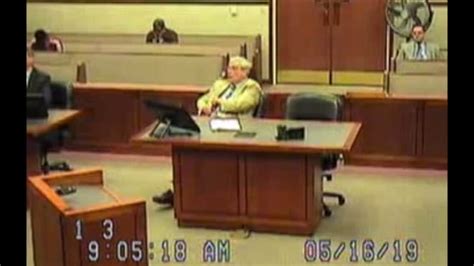
A retired Minnesota judge who presided over Derek Chauvin’s trial in the murder of George Floyd described the experience as a “highlight” of his career, reflecting on the landmark case’s complexities and the profound impact it had on the community and the nation.
Retired Judge Peter Cahill, who oversaw the high-profile trial that captivated the world, recently spoke about the pressures, challenges, and ultimate significance of the Chauvin case. Despite the immense scrutiny and the weight of responsibility, Cahill deemed the trial a pinnacle of his judicial service, acknowledging the gravity of the issues at stake and the historical implications of the verdict.
Cahill’s reflections offer insight into the inner workings of a trial that was not just a legal proceeding but a cultural flashpoint. The case, which unfolded against a backdrop of nationwide protests against racial injustice and police brutality, tested the legal system’s ability to deliver justice in a highly charged environment.
The judge had to navigate a complex web of legal arguments, evidentiary challenges, and intense public interest, all while ensuring a fair trial for both the prosecution and the defense. The outcome of the trial, which resulted in Chauvin’s conviction on all three counts – second-degree unintentional murder, third-degree murder, and second-degree manslaughter – was seen by many as a pivotal moment in the ongoing struggle for racial equality in the United States.
The case began on May 25, 2020, when Derek Chauvin, a white Minneapolis police officer, knelt on George Floyd’s neck for over nine minutes, leading to Floyd’s death. The incident, captured on video by bystanders, sparked widespread outrage and protests across the country and around the world. The video evidence became a central element of the prosecution’s case, providing a stark and irrefutable account of the events that led to Floyd’s death.
The trial commenced in March 2021, with Judge Cahill presiding over the proceedings. From the outset, the trial was marked by intense media coverage and public interest. The selection of jurors was a meticulous process, aimed at ensuring an impartial jury that could weigh the evidence fairly and objectively. The prosecution, led by Steve Schleicher and Jerry Blackwell, presented a compelling case, arguing that Chauvin’s actions were a clear violation of police protocols and a direct cause of Floyd’s death.
The defense, led by Eric Nelson, argued that Floyd’s death was due to underlying health conditions and the presence of drugs in his system, rather than solely due to Chauvin’s actions. Nelson also contended that Chauvin acted reasonably under the circumstances, given the perceived threat posed by Floyd.
Throughout the trial, Judge Cahill was responsible for maintaining order in the courtroom, ruling on legal objections, and instructing the jury on the applicable laws. His role was crucial in ensuring that the trial proceeded fairly and that both sides had the opportunity to present their cases.
“The Chauvin trial was a unique and challenging experience,” Cahill noted. “It required a delicate balance of upholding the law, protecting the rights of the accused, and acknowledging the profound impact of the case on the community.”
The evidence presented during the trial was extensive, including video footage, expert testimony, and eyewitness accounts. Medical experts testified that Floyd died from asphyxia due to the compression of his neck, while law enforcement experts testified that Chauvin’s actions were inconsistent with accepted police practices.
The defense presented its own experts who argued that Floyd’s pre-existing health conditions and drug use contributed to his death. However, the prosecution effectively countered these arguments, emphasizing that Chauvin’s actions were the primary cause of Floyd’s death.
After weeks of testimony and deliberation, the jury reached a verdict on April 20, 2021, finding Chauvin guilty on all three counts. The verdict was met with a mix of relief, celebration, and solemn reflection. Many saw it as a step towards accountability for police misconduct and a reaffirmation of the principle that no one is above the law.
“The verdict in the Chauvin case was a significant moment for our community and our country,” Cahill stated. “It demonstrated that the legal system can deliver justice, even in the face of intense public pressure and scrutiny.”
Following the verdict, Chauvin was sentenced to 22.5 years in prison. He was also charged with federal civil rights violations in a separate case, to which he pleaded guilty. The federal charges stemmed from the violation of Floyd’s constitutional rights, specifically the right to be free from unreasonable force.
The Chauvin trial had a far-reaching impact, prompting widespread discussions about race, policing, and justice in the United States. It led to calls for police reform and greater accountability for law enforcement officers. The case also highlighted the importance of video evidence in holding police officers accountable for their actions.
“The Chauvin case has sparked a national conversation about the need for police reform and greater accountability,” Cahill observed. “It is my hope that this conversation will lead to meaningful changes that will prevent similar tragedies from happening in the future.”
The trial also underscored the importance of an independent judiciary in ensuring that justice is administered fairly and impartially. Judge Cahill’s role in presiding over the trial was critical in maintaining order, upholding the law, and protecting the rights of all parties involved.
“The role of a judge is to be a neutral arbiter, to ensure that the law is applied fairly and impartially,” Cahill explained. “In the Chauvin case, I was committed to fulfilling that role to the best of my ability.”
Looking back on the trial, Cahill acknowledged the immense pressure he faced, both from within the courtroom and from the outside world. He emphasized the importance of remaining focused on the facts and the law, and of not being swayed by public opinion or political considerations.
“The pressure during the Chauvin trial was immense,” Cahill admitted. “But I was determined to remain true to my oath and to ensure that the trial was conducted fairly and impartially.”
Cahill’s reflections on the Chauvin trial provide valuable insights into the complexities of the American legal system and the challenges of administering justice in a highly charged environment. His commitment to upholding the law and protecting the rights of all parties involved serves as a model for judges across the country.
The Derek Chauvin trial was not just a legal proceeding; it was a cultural moment that forced the United States to confront its history of racial injustice and police brutality. The trial’s outcome, while seen by many as a victory for justice, also underscored the long road ahead in achieving true equality and accountability. Judge Cahill’s perspective offers a unique and important perspective on this landmark case and its enduring legacy.
Beyond the legal and social implications, the Chauvin trial also highlighted the human element of the justice system. The trial involved real people whose lives were forever changed by the events of May 25, 2020. George Floyd’s family, Derek Chauvin, the witnesses who testified, and the jurors who rendered the verdict all experienced the trial in profound ways.
“The Chauvin trial was a reminder that the justice system is not just about laws and procedures; it is also about people,” Cahill reflected. “It is about the impact that our decisions have on the lives of others.”
The trial also underscored the importance of community involvement in the justice system. The protests that followed Floyd’s death demonstrated the power of collective action and the importance of holding those in power accountable. The trial served as a reminder that justice is not something that is handed down from above; it is something that must be fought for and demanded by the people.
“The Chauvin trial showed the power of community involvement in the justice system,” Cahill stated. “It demonstrated that when people come together and demand justice, they can make a difference.”
As the nation continues to grapple with issues of race, policing, and justice, the Chauvin trial will continue to serve as a touchstone. It will be remembered as a moment when the legal system was tested and ultimately held accountable for its actions. Judge Cahill’s reflections on the trial offer valuable insights into the challenges and complexities of administering justice in a society grappling with profound social and political divisions.
In reflecting on his career, Cahill emphasized the importance of integrity, fairness, and a commitment to the rule of law. He noted that these principles are essential for maintaining public trust in the justice system and for ensuring that justice is administered fairly and impartially.
“Integrity, fairness, and a commitment to the rule of law are essential for any judge,” Cahill said. “These principles are what allow us to uphold the Constitution and to ensure that justice is done.”
The retired judge’s candid reflections on the Chauvin trial underscore the weight of responsibility that judges carry and the profound impact that their decisions can have on individuals, communities, and the nation as a whole. The trial serves as a reminder that the pursuit of justice is an ongoing process and that it requires constant vigilance and a commitment to upholding the principles of fairness, equality, and accountability.
The judge’s remarks highlight the importance of upholding the integrity of the judicial process, even in the face of intense public scrutiny and pressure. His dedication to ensuring a fair trial for both the prosecution and the defense is a testament to the principles of due process and the rule of law.
The Chauvin trial, as Cahill notes, was not just a legal event but a cultural phenomenon that sparked a national conversation about race, policing, and justice. The trial’s outcome and the broader societal response to it have had a lasting impact on the American landscape.
Looking ahead, the lessons learned from the Chauvin trial can help inform efforts to reform the criminal justice system and to address the root causes of racial injustice and police brutality. The trial serves as a reminder that justice is not just about individual cases; it is about creating a society where all people are treated with dignity and respect.
In conclusion, Judge Cahill’s reflections on the Derek Chauvin trial provide valuable insights into the complexities of the American legal system and the challenges of administering justice in a society grappling with profound social and political divisions. His commitment to upholding the law and protecting the rights of all parties involved serves as a model for judges across the country. The trial remains a significant moment in American history, one that will continue to shape the national conversation about race, policing, and justice for years to come. The insights from those involved, like Judge Cahill, are invaluable in understanding its full impact and implications.
The Chauvin trial was unique in its scope and its impact, but it also reflects broader trends in the American legal system. The rise of video evidence, the increasing scrutiny of police practices, and the growing awareness of racial bias are all factors that are shaping the way justice is administered in the United States.
The trial also underscores the importance of jury service and the role of ordinary citizens in the justice system. The jurors in the Chauvin case were tasked with making a difficult decision, and they did so with diligence and integrity. Their verdict reflects the collective judgment of the community and serves as a testament to the power of the jury system.
The Chauvin trial, while undoubtedly a “highlight” in Judge Cahill’s career, also represents a somber chapter in American history. The death of George Floyd was a tragedy that exposed deep-seated issues of race and inequality in the United States. The trial served as a reminder that the pursuit of justice is an ongoing process and that there is still much work to be done to create a society where all people are treated with dignity and respect.
The Chauvin case has also highlighted the importance of accountability for law enforcement officers. The trial demonstrated that police officers are not above the law and that they can be held accountable for their actions. This is a crucial step in building trust between law enforcement and the communities they serve.
The judge’s reflections on the Chauvin trial serve as a reminder of the importance of an independent judiciary and the role of judges in upholding the rule of law. Judges must be able to make decisions based on the facts and the law, without being swayed by public opinion or political considerations. This is essential for ensuring that justice is administered fairly and impartially.
The Chauvin trial was a complex and multifaceted event that had a profound impact on the United States and the world. Judge Cahill’s reflections on the trial provide valuable insights into the challenges of administering justice in a society grappling with profound social and political divisions. The trial serves as a reminder that the pursuit of justice is an ongoing process and that it requires constant vigilance and a commitment to upholding the principles of fairness, equality, and accountability. It also serves as a landmark case that will be studied and debated for generations to come.
The lasting legacy of the Chauvin trial extends beyond the legal realm, influencing social and political discourse, prompting legislative action, and shaping public perceptions of justice and accountability. The case has become a symbol of the ongoing struggle for racial equality and a call for systemic change.
The impact of the trial is evident in the numerous police reform initiatives that have been implemented at the local, state, and federal levels. These reforms aim to improve police training, enhance accountability mechanisms, and address issues of racial bias in law enforcement. The trial has also spurred increased public awareness of the need for comprehensive criminal justice reform.
The Chauvin trial has also had a significant impact on the media landscape. The trial was covered extensively by news organizations around the world, and the media played a crucial role in informing the public about the events that unfolded in the courtroom. The trial also highlighted the challenges of covering high-profile cases in a fair and unbiased manner.
The trial also served as a reminder of the importance of community engagement and participation in the justice system. The protests that followed Floyd’s death demonstrated the power of collective action and the importance of holding those in power accountable. The trial also underscored the need for greater community involvement in shaping policies and practices related to policing and criminal justice.
The Chauvin trial was a watershed moment in American history, one that will continue to shape the national conversation about race, policing, and justice for years to come. Judge Cahill’s reflections on the trial provide valuable insights into the complexities of administering justice in a society grappling with profound social and political divisions. His commitment to upholding the law and protecting the rights of all parties involved serves as a model for judges across the country, solidifying the trial’s place as a historic legal event with far-reaching implications.
FAQ Section:
Frequently Asked Questions (FAQ) about the Derek Chauvin Trial:
-
What were the charges against Derek Chauvin?
Derek Chauvin was charged with second-degree unintentional murder, third-degree murder, and second-degree manslaughter in the death of George Floyd. He was found guilty on all three counts. According to the Yahoo News article, Judge Cahill reflected on the complexities of the trial after the guilty verdict was delivered.
-
What was the main evidence presented in the Derek Chauvin trial?
The main evidence included video footage of Derek Chauvin kneeling on George Floyd’s neck for over nine minutes, as well as expert medical testimony stating that Floyd died from asphyxia due to the compression. Eyewitness accounts and police practices also played a significant role in the trial. The Yahoo News article mentioned the importance of the judge ensuring a fair trial amidst intense media coverage.
-
What was the defense’s argument in the Derek Chauvin trial?
The defense argued that George Floyd’s death was due to underlying health conditions and the presence of drugs in his system, rather than solely due to Derek Chauvin’s actions. They also contended that Chauvin acted reasonably under the circumstances, given the perceived threat posed by Floyd. The Yahoo News article quotes Judge Cahill saying that the trial required balancing protecting the rights of the accused.
-
What was Judge Peter Cahill’s role in the Derek Chauvin trial?
Judge Peter Cahill presided over the Derek Chauvin trial, maintaining order in the courtroom, ruling on legal objections, and instructing the jury on the applicable laws. His role was crucial in ensuring that the trial proceeded fairly and that both sides had the opportunity to present their cases. The Yahoo News article emphasizes that Judge Cahill saw the trial as a “highlight” of his career.
-
What impact did the Derek Chauvin trial have on discussions about race and policing in the United States?
The Derek Chauvin trial sparked a national conversation about the need for police reform and greater accountability for law enforcement officers. It led to calls for changes in police practices and a greater focus on addressing racial bias in the criminal justice system. The Yahoo News article states that the case has sparked a national conversation about the need for police reform and greater accountability.
-
What was the sentencing for Derek Chauvin after being found guilty?
Following his conviction, Derek Chauvin was sentenced to 22.5 years in prison. He also faced federal civil rights charges in a separate case, to which he pleaded guilty.
-
Why is the Derek Chauvin trial considered a landmark case?
The Derek Chauvin trial is considered a landmark case because it addressed issues of police brutality and racial injustice, leading to significant national and international discussions about systemic racism and police accountability. It highlighted the importance of video evidence in such cases and underscored the public demand for justice and reform.
-
How did the community react to the verdict in the Derek Chauvin trial?
The verdict in the Derek Chauvin trial was met with a mix of relief, celebration, and solemn reflection. Many saw it as a step towards accountability for police misconduct and a reaffirmation of the principle that no one is above the law. Protests and demonstrations occurred both in support of and against the verdict, reflecting the deep divisions within the community.
-
What lessons can be learned from the Derek Chauvin trial?
The Derek Chauvin trial offers several important lessons, including the need for police reform, the importance of accountability for law enforcement officers, the significance of video evidence in documenting police interactions, and the ongoing struggle for racial justice in the United States. It also underscores the importance of an independent judiciary and the role of judges in upholding the rule of law.
-
What is the broader context of the Derek Chauvin trial in terms of the Black Lives Matter movement?
The Derek Chauvin trial occurred against the backdrop of the Black Lives Matter movement, which gained significant momentum following the death of George Floyd. The trial became a focal point for activists and advocates who sought to address systemic racism and police brutality against Black individuals. The case amplified the calls for police reform and greater accountability for law enforcement officers, furthering the goals of the Black Lives Matter movement.
-
How was the jury selected for the Derek Chauvin trial, and what measures were taken to ensure impartiality?
The jury selection process was meticulous, aimed at ensuring an impartial jury. Prospective jurors were questioned extensively about their views on race, policing, and the Black Lives Matter movement. The goal was to identify individuals who could set aside their personal beliefs and render a verdict based solely on the evidence presented in court. Challenges for cause and peremptory challenges were used to remove potential jurors who were deemed biased.
-
What were some of the challenges Judge Cahill faced while presiding over the Derek Chauvin trial?
Judge Cahill faced numerous challenges, including managing intense media coverage, ensuring the safety and security of the courtroom, addressing legal objections and motions from both sides, and maintaining order in the courtroom. He also had to navigate the emotional and political context surrounding the trial, balancing the rights of the accused with the need for justice and accountability.
-
What role did video evidence play in the Derek Chauvin trial?
Video evidence played a crucial role in the Derek Chauvin trial, particularly the bystander video that captured Chauvin kneeling on George Floyd’s neck. This video provided a stark and irrefutable account of the events that led to Floyd’s death and became a central element of the prosecution’s case. The video evidence helped to counter the defense’s arguments and ultimately contributed to Chauvin’s conviction.
-
What is the significance of the federal civil rights charges against Derek Chauvin?
The federal civil rights charges against Derek Chauvin stemmed from the violation of George Floyd’s constitutional rights, specifically the right to be free from unreasonable force. These charges were separate from the state charges for murder and manslaughter and carried additional penalties. Chauvin’s guilty plea to the federal charges further underscored the severity of his actions and the need for accountability.
-
How did the Derek Chauvin trial impact police reform efforts at the local, state, and federal levels?
The Derek Chauvin trial prompted numerous police reform initiatives at the local, state, and federal levels. These reforms aimed to improve police training, enhance accountability mechanisms, and address issues of racial bias in law enforcement. Some specific examples include changes to use-of-force policies, increased funding for community policing programs, and the implementation of body-worn cameras.
-
What were the key arguments made by the prosecution during the trial?
The prosecution argued that Derek Chauvin’s actions were a clear violation of police protocols and a direct cause of George Floyd’s death. They presented evidence showing that Chauvin’s use of force was excessive and unreasonable and that he failed to provide Floyd with necessary medical assistance. The prosecution also emphasized that Chauvin acted with malice and disregard for Floyd’s life.
-
How did the defense attempt to discredit the video evidence presented by the prosecution?
The defense attempted to discredit the video evidence by arguing that it did not provide a complete picture of the events and that it was taken out of context. They also argued that the video did not show the full extent of George Floyd’s resistance and that it did not account for his underlying health conditions. However, these arguments were largely unsuccessful in swaying the jury.
-
What were the instructions given to the jury regarding reasonable doubt and the burden of proof?
Judge Cahill instructed the jury that the burden of proof rested entirely with the prosecution and that they had to prove beyond a reasonable doubt that Derek Chauvin was guilty of the charges against him. He explained that reasonable doubt is a doubt based on reason and common sense and that it must arise from the evidence or lack of evidence presented in the trial. The judge emphasized that the jury could not convict Chauvin unless they were firmly convinced of his guilt.
-
How did the Derek Chauvin trial address the issue of qualified immunity for law enforcement officers?
The Derek Chauvin trial did not directly address the issue of qualified immunity, which protects law enforcement officers from liability in civil lawsuits unless their conduct violates clearly established statutory or constitutional rights, and there’s no arguable justification for their actions. However, the trial underscored the importance of holding police officers accountable for their actions and highlighted the need for greater scrutiny of police practices.
-
What are some of the potential long-term implications of the Derek Chauvin trial for the criminal justice system in the United States?
Some of the potential long-term implications of the Derek Chauvin trial include increased scrutiny of police practices, greater accountability for law enforcement officers, a renewed focus on addressing racial bias in the criminal justice system, and a greater willingness to prosecute police officers for misconduct. The trial may also lead to further police reform efforts at the local, state, and federal levels.









